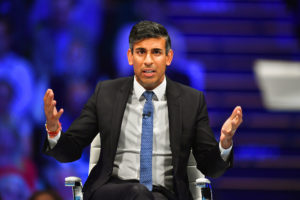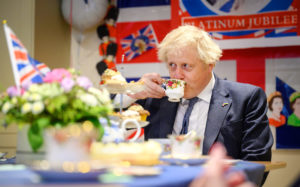“The cost of living, too high! Waiting times in the NHS, too long! Illegal migration, far too much!” This could have been Keir Starmer thundering from the Opposition benches. Except it wasn’t. This was Rishi Sunak’s assessment of the government he leads, delivered in his New Year launch speech. Failing on the economy, failing on health, failing on borders. It was scathing stuff. But it’s not as though the Prime Minister can pretend he and his party are delivering.
“New Year should be a time of optimism and excitement,” he said. “Yet I know many of you look ahead to 2023 with apprehension.” Sunak cheerily called for a rejection of pessimism and fatalism, and refused to limit aspirations. Narrated like an adult reading a storybook to a child before bed, the speech’s sunny tone felt misjudged. And delivered with such cloying earnestness and saccharine enthusiasm, it had the subtlety and grace of a clown in a morgue.
Optimism is a powerful, unifying force, and Sunak is right to identify it as an important political goal. But there was something missing in his message — a reason to feel optimistic. Platitudes don’t pay for heating bills or get you seen by a GP faster — people need concrete, tangible reasons to believe that things are getting better, or at the very least, will do soon. The future of Sunak’s party depends on it.
When people are scared, they want realism — they to be levelled with. “I don’t expect you to like my message, but I hope you will understand and agree with my justifications for it,” he could have said. But the speech contained no comprehensive policy shift — no reason for people to buy-in to changes that might improve their lives with commitment and patience. It was just more of the same motherhood and apple pie that has been promised before, but delivered in an even more cheerful manner.
An ill mood grips the country, not just because of frustration at temporary factors like strike disruption or winter pressures on health services — our political economy is convulsing under chronic polycrisis. The annual NHS winter struggle began last summer, and continues to metastasise through record A&E delays, growing waiting lists and an overstretched ambulance service. Our sea border is, in practice, an open door with a criminal gang empire attached. Inflation stands at a 40-year high. Every train journey now requires strike planning. Nothing seems to be working. I sat with the foreign-born head of a large business recently who asked me, “Why do the British put up with so much? In France, Italy, or Spain, they would be rioting in the streets at half of this.” They are right to be perplexed by our passivity to mediocrity and relative national decline. Said to be one of our great and admirable national character strengths, the British stiff upper lip is proving our undoing.
But instead of introspection about economic growth and government competence — and where it isn’t coming from — ruling Conservative politicians are often wallowing in pessimism and giving up the fight: rising stars such as Dehenna Davison, and established parliamentarians such Sajid Javid and William Wragg have all announced their intention to stand down at the next election. And those who remain can be overheard moaning to journalists about how difficult being in charge is. Sympathy, as they say, is in the dictionary.
Tories, far from selling Sunak’s intended optimistic vision of betterment and progress to the electorate, are now shadowboxing an imagined liberal-Remain establishment that, after over a decade of holding the levers of power in No 10, prevents them from improving things. Far better to play fight with a pretend, ever-shifting and invisible enemy, than to properly look yourself in the mirror, and be haunted by the mundane reality of your own serial incompetence. It is no longer enough, or even credible in the eyes of voters, to say that Labour would be worse than this rabble.
Government frontbenchers such as Andrew Griffith will not be taken seriously by voters if they actively celebrate the fact that the agencies they run work better under emergency army management, than they did under the previous staff of 12 years. Criticising the failure of national institutions is what oppositions do, not His Majesty’s ministers. Meanwhile, other senior Conservatives cosplay being poor in this season of squeezed incomes, as they spout tone-deaf frugality porn of ironing gift wrap from the comfort of their middle-class cottage, complete with wood-beam ceiling. At best this saves pennies, while offering the environmental benefit of perhaps a gram of sirloin steak. It is bread and circuses, without the bread, and without a circus.
Enough with this Stakhanovite Oympics of suffering in which the individuals engage in performative parsimony for the good of the nation. Instead of Tory MPs judging marginally above average-earning firefighters for using food banks, they should be asking themselves why food bank usage is surged under their watch, and why someone on an above-average income would turn to such a facility. They should be asking themselves if austerity actually achieved anything at all.
The Conservative Party has, recently, burned through as many ideologies as it has leaders, realising in turn that each are electoral dead-ends. First it gave up on Cameronite liberal conservatism. Then, under Theresa May, it gave up on austerity. Now, it has given up on optimistic Johnsonian boosterism. It’s all but given up on Brexit, electing to ignore the lack of delivery to date. And it’s in the process of giving up its one remaining ideology: power for its own sake.
It is not the leadership nor the senior parliamentarians of the party that are keeping the pilot light of conservatism lit. It is what remains of the scorched grassroots. Take the recently launched Next Gen Tories campaign group. Led by 27-year-old James Cowling, chair of the Greenwich Conservative constituency association, the group has a far more optimistic and comprehensive ideological vision for what the country needs to sail out of the economic and political doldrums than any government minister.
The group rightly identifies the modern Conservative curse — that by chasing its own electoral advantage by enfranchising and enriching elderly homeowners, it has yielded a highly unequal, low-growth society in which the young have no incentive to become conservatives themselves. This is not inevitable — as John Burn Murdoch recently put it, “Millennials are shattering the oldest rule in politics.” It could be a Greek tragedy: by mindlessly and greedily chasing power over policy outcomes, the vainglorious fool destroyed itself — and nobody cared.
We should all be particularly worried by Sunak’s obsession with “innovation” — mentioned 11 times in his speech. Not because it isn’t a laudable aim, but because it is clearly his grand vision of where economic growth will come from. Certainly, we should increase capital investment tax breaks to incentivise businesses to invest in new technologies, as Sunak himself has acknowledged. But innovation in a modern economy requires not proximity to coal and iron ore and investment in new machinery; it requires great minds to meet in cities to discuss their ideas, and the larger the city the better.
This matters when the British planning system prevents the growth of cities and even the densification of already-urban areas. In a world where the basic tenets of 20th-century capitalism, such as homeownership, are not granted to the young as they mature into middle age, why bother moving to a city to better yourself? Sunak’s Tory electoral coalition of elderly homeowners have no interest in homebuilding to reduce the cost of living for their children and grandchildren. Nor do they care about innovation, now they have left the workforce.
Without growing cities, we can give up on productivity growth. And without productivity growth, we can give up on the money to solve our polycrisis society. “I pledge that I will be honest about the challenges we face. And I will take the tough but necessary decisions to ensure our great country achieves its enormous potential.” Sorry, Mr Sunak. You’ve fallen at the first hurdle.
Disclaimer
Some of the posts we share are controversial and we do not necessarily agree with them in the whole extend. Sometimes we agree with the content or part of it but we do not agree with the narration or language. Nevertheless we find them somehow interesting, valuable and/or informative or we share them, because we strongly believe in freedom of speech, free press and journalism. We strongly encourage you to have a critical approach to all the content, do your own research and analysis to build your own opinion.
We would be glad to have your feedback.
Source: UnHerd Read the original article here: https://unherd.com/




